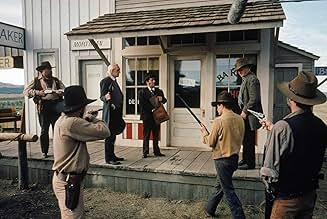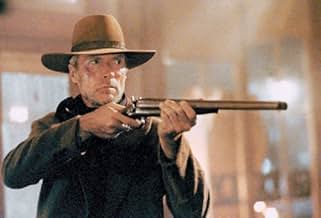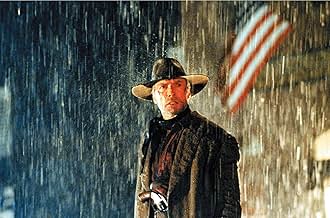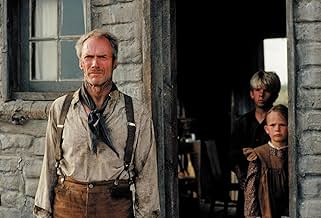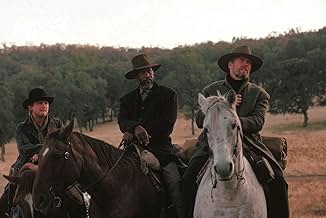Il pistolero William Munny dopo anni di isolamento viene reclutato per compiere una missione con l'aiuto del suo vecchio partner e di un nuovo giovane compagno.Il pistolero William Munny dopo anni di isolamento viene reclutato per compiere una missione con l'aiuto del suo vecchio partner e di un nuovo giovane compagno.Il pistolero William Munny dopo anni di isolamento viene reclutato per compiere una missione con l'aiuto del suo vecchio partner e di un nuovo giovane compagno.
- Vincitore di 4 Oscar
- 52 vittorie e 47 candidature totali
- Little Sue
- (as Tara Dawn Frederick)
- Will Munny
- (as Shane Meier)
Riepilogo
Recensioni in evidenza
Kevin Costner tries hard but he just doesn't get it. Dances With Wolves wasn't really a western. It wasn't even an anti-western. It was more like a political indictment of the actions of the Americans of the time. For all that I did enjoy it.
Most of the others since Unforgiven are movies where somebody decides to put the characters on a horse, but the story is just generic pap. Nobody has the balls to make something with a meaning.
I will grant that Deadwood is a truly excellent series but it isn't a movie.
That's why I believe that Unforgiven is a fitting end to the western genre. I won't get all rhapsodic and spout a bunch of crap about how Clint made this movie as a symbol of the end of the western. Cuz that's a load of crap. The script had been around since the early 70s when things were still going strong. What it is, is a movie that shows us that there is no black and white in any time. There are only shades of grey.
It is also just as dirty and violent as things actually were for most people in that era. Life was comparatively cheap and most people didn't have much hope of justice. The middle class was very small and the upper class was tiny. The vast majority belonged to the under-classes.
Good guys didn't wear white hats and not every sheriff was a good guy. Some were violent and corrupt braggarts and bullies. Little Bill mocks English Bob's self-promotion, but at the same time he knocks Bob down he builds himself up. He doesn't bother with courts or judges and he is his own executioner. He isn't motivated by any innate sense of justice when he deals with any criminal elements. It's more that he takes it as an insult to his own power.
William Munny is a killer, plain and simple. He has human feelings but basically he is unrepentant. He changed for his wife, but like many changes it wasn't permanent. He won't sleep with a whore but when he needs money he is willing to kill for it. At the same time he treats the whore with kindness and is loyal to his friend. And somehow he managed to get a good woman to love him. A classic anti-hero.
Rather than being about the end of the Western genre I believe that it is actually an ode to what came before it. Sergio Leone would have been proud.
Eastwood stars as William Munny a retired gunslinger with a guilt-filled past. He lives alone with his two children and grave of his young wife outside. One day a young cowboy, The Schofield Kid (Jaimz Woolvett), comes in need of his service to hunt down some men who cut up a whore. William reluctantly accepts and with the help of Ned Logan (Morgan Freeman) they work together to track down the criminals. Meanwhile, the sheriff of the town, Little Bill Daggett (Gene Hackman) is also looking for them. This then leads to a bloody showdown climax, welcoming back a sort of 'Man With No Name' character to the genre.
William Munny is a cold-blooded killer. The Schofield Kid wants to be one. But, all the murders and sins Munny used to commit has affected him in an extraordinary way. He takes no hesitation in killing. In the climax he just walks past a man he shot who didn't die and shoots him dead. It may sound like nothing now, but he just took a life for no apparent reason. When the Kid kills his first man, of which deserved it, he hesitates. This is The Kid who is so eager to kill people as he thinks it will make him a man. But after the assassination, he breaks down. He realized what he had done. He had wiped another man of the earth. And Munny does it with ease. So does Little Bill. He is a violent and brutal cop who uses torture to get what he wants from the prisoners. Logan also finds it hard to take lives.
The film studies on how much a life is worth. Sometimes it is worthless (see Tarantino or Scorsese films) and sometimes it is a major feature. Usually a film only does one. Unforgiven does both. A life isn't worth the same amount to each person. When a life is taken, it is the killer who decides how much it is worth by how much it affects him. Whether he just lets it slide (Munny and Little Bill) or kills someone and calls it a day (Kid and Logan), because they can't bring themselves to forgetting it. This is the most thought-provoking thing for me personally, ever.
Unforgiven in my opinion is the greatest western. Actually, its the greatest film of all-time. It shows how violent it was back then, and the fact everybody was beaten. It is more realistic than any of Leone's 'Man With No Name' films (though I will admit they were set in a sort of fantasy land). But, Munny is not proud of his violent nature. He blames it on alcohol; which his wife persuaded him to quit to explain why he also gave up being a murderer. The film shows the cowboys as they really are, either cowards or killers. The choice of word 'coward' is to say that they should be killers, as that is apparently what a man is (an exaggeration) as most westerns glorify violence, but the men can't handle it.
Clint Eastwood did an amazing job as William Munny. He showed how he regretted his past very well by admitting to it in a shameful way; like when asked if he killed women and children he replied "I've killed just about anything that walked or crawled at one time or another, and I'm here to kill you ". He even admits that he will meet Little Bill in Hell. Gene Hackman delivers one of the greatest performances of the decade, the tension he makes is incredible. Woolvett and Freeman remain in solid above average performances throughout.
The script, written by David Webb Peoples, buzzed around Hollywood for nearly 20 years, even being rejected by some of the cast, before Eastwood picked it up. Clint Eastwood deserved his Oscar for best direction. The plot flowed fluently with some surprises and memorable lines. An instant classic. The cinematography is much different that of 'The Good, The Bad and The Ugly' or the others westerns Eastwood appeared in. It is a much cleaner and crisp view, yet also being extremely raw. The score, though not used often is very refreshing and moving.
'Unforgiven' is an unforgettable look on life, man and the real west. One of the most powerful films of the '90s. A true triumph exploring important morals. Do not miss it.
9/10
Clint Eastwood signed off from the Western genre with this magnificent 1992 picture, the appropriation and irony of which is in itself a majestic point of reference. After the script had been knocking around for nigh on twenty years (written by Blade Runner scribe David Webb Peoples), Eastwood seized the opportunity to play William Munney and lay bare the mythologies of the Wild West.
It's striking that the makers here have lured us in to being firmly on Munney's side, we are, incredibly, influenced by Eastwood's part in the history of the Western. In spite of Munney's obvious murky past (despicable crimes they be), we wait (and hope) for Munney to make a quip and way lay the bad guys - in fact salivating at the prospect is probably closer to the truth. So it's with enormous credit that Eastwood, and his magnificent cast and crew, manage to fuddle all our respective perceptions of the West and the characters we ourselves have aged with.
It's not for nothing that W.W. Beauchamp (Saul Rubinek) is one of the critical characters on show, this even though we didn't expect that to be the case. Beauchamp is a writer of penny pulpy novels that tell of derring-do heroics, gunslingers with a glint in their eye who deal death as some sort of heroic encore. This gives Unforgiven an excellent sleight of hand, for this West is grim and a destroyer of all illusions and it's not controversial to say that this is indeed a good thing.
Eastwood is greatly served by the actors around him, Morgan Freeman, Gene Hackman (winning the Best Supporting Actor Oscar for a script he turned down many years before!), Rubinek, Frances Fisher, Anna Thomson, Jaimz Woolvett and an incredible cameo from Richard Harris. Along with Hackman's win for his brutally tough portrayal of Sheriff "Little Bill" Daggett, Unforgiven also won Oscars for Eastwood for his clinically tight direction, Best Picture, Best Editing and it was nominated in another five categories. One of those nominations was for Jack Green's cinematography, which now, in this age of High Definition enhanced cinema, can be seen in all its wonderful glory. The Alberta location is magically transformed into the Western frontier, with the orange and brown hues a real treat for the eyes.
Ultimately though, Unforgiven is a lesson in adroit film making, where across the board it works so well. Why? Well because the man at the helm knows this genre inside out, he was after all the sole flag bearer for practically 25 years. He learnt from his peers, and thus Eastwood has crafted a thematically complex piece that for all its violence, debunking and melancholy pulse beats, is a film that is as beautiful as it is most assuredly stark. An incredible and true highlight of modern day cinema, regardless of being a genre fan or not. 10/10
Besides his now distinctive storytelling, there are numerous factors that make this a landmark Western. The ensemble cast could not have been stronger and there were no weak performances. The soundtrack accentuates the intended atmosphere of the director. A single detracting factor I could find only just qualifies as such. Munny's whimsical lines seemed a little contrived at times. They droned on like pale attempts to capture the Western era. But this is a consequence of the fact that they were more to do with the character of William Munny. He is after all a reformed killer with a now passive approach to people. Given this fact and also that it may have been distracting since it was so out of sync with what we are used to seeing from Eastwood, I still have to list it as a demerit on the account it slightly jerked me out of the story.
Hollywood producers have to satisfy audience preferences if investments are going to accrue profits. It is the nature of the beast. The action and more specifically the Western genre will stick to tried and tested formulas in order to guarantee audience acceptance. But every so often you get people who as a natural consequence of their unique character appeal are able to deliver a story that is outside these understandably restrictive boundaries. Eastwood is a cool individualist who normally plays characters who are not team players and do it their own way. His own way this time is to give the western genre a real story oozing characterization. A sort of ballad for the bad guy.
The ballads tune provides the story with a sad, introspective mood, within the opening and closing scenes. The opening scene depicts Munny in his new found life. He is cured of his wicked ways, helped by his dear, departed wife. But men are not willing to forgive or forget his monstrous deeds and in the final scenes he is who he has to be. Such is the sorrowful life of William Munny.
Westerns are typified by clearly defined goodies and baddies, but this is definitely not the case here. Eastwood and Freeman play reformed killers who find circumstances drawing them once again to their evil ways. But the older and wiser men now realize the value of life and come face to face with their troubled consciences. This is unlike their naïve, young partner who is attracted to the bravado image of the killer and relishes taking a man's life. This moral issue is virtually taboo for the classic western which glamorizes the lawlessness and the hero attraction of the gunslinger. This is also why in my view no-one besides Eastwood should have handled this movie.
Then we have the juiciest character of the movie superbly played by Gene Hackman worthy of the weight of every micro granule of his Oscar. He is the epitome of every hard-line lawman that ever was. The misguidance of the so called righteously empowered, swinging the hammer against evil for good. Hackman must have salivated when he read the script since there was obvious relish in his performance. All the better for the movie, and of course for Eastwood at the Oscars. By far the best performance and the others were good further underlining the talent of the man.
The antagonist of the movie is almost always the most complex and thus most interesting to analyze. His vain attempts at carpentry are his way of trying to appear to be a good man. There is purity in building ones own home and it is this wholesomeness that he wishes to capture. In that way his fellow citizens will see him as a simple man only wanting to lead a righteous life. But his inability as a carpenter is indicative of his depravity. He cannot be a good man. The source of his drive is anger and hatred. It is through this failing that we realize he cannot escape who he is.
Indeed it was not only the power of the script that gave the audience a spellbinding climax, but the talents of the actors. The actors' characterizations deliver the audience a spellbinding climax. It is only through Hackman's performance that we not only acknowledge his ending as inevitable, but also as deserving. We saw him as a man who virtually thought that he was righteously empowered to rid the earth of Munny and his kind What he thought was an honorable task was one rather of abuse and suppression. He became the baddie in the eyes of the audience and it is he who the audience wants to see justice served upon.
Munny was so weak throughout the movie that the eruption of his evil ways captured the interest of the audience. He transformed into the Eastwood of old the anti hero with a far more malevolent presence. Never could we have sensed this hatred and evil that we now see in William Munny. It is now that the frivolity of his mannerisms that I touched on in the beginning adds to the story as it helps to accentuate the turn in character. He is now only a killer, in it neither for money or fame as the writer nearly finds out to his tragic detriment.
Those who have only seen his Westerns of old or the 'Dirty Harry' movies may enter the cinema with expectations of such like will either be disappointed or pleasantly surprised. It is the atypical western and an unfamiliar portrayal by Eastwood. But I believe that most people will have the latter reaction. The differences are their strengths helped by the fact that it was a superbly crafted movie with a meaningful story and thought provoking lessons for our heroes and villains. Eastwood was directly suited to the roles that we identify him with, but it is exactly because of this suitability that he eases into the role of Munny. No mellowing with age, no identification with the mainstream, he has always done it his way, and he is so good that any way could be his way.
Oscars Best Picture Winners, Ranked
Oscars Best Picture Winners, Ranked
Lo sapevi?
- QuizDirector Clint Eastwood dedicated the film to directors and mentors Sergio Leone and Don Siegel. The final screen credit reads, "Dedicated to Sergio and Don."
- BlooperEnglish Bob says that no assassin would dare hold a gun to a monarch. There were, in fact, six assassination attempts made against Queen Victoria, and they were well known at the time. He certainly would have known about them. However, it should be noted that English Bob was mainly saying this to antagonize people and not necessarily because he truly believed it.
- Citazioni
Little Bill Daggett: You'd be William Munny out of Missouri. Killer of women and children.
Will Munny: That's right. I've killed women and children. I've killed just about everything that walks or crawled at one time or another. And I'm here to kill you, Little Bill, for what you did to Ned.
- Curiosità sui creditiAt the end of the credits, there is caption reading, "Dedicated to Sergio and Don". This is a reference to late directors Sergio Leone (who directed Clint Eastwood in the Dollars trilogy) and Don Siegel (who directed Eastwood in Dirty Harry and Escape from Alcatraz).
- Versioni alternativeThe end credits in the current TV prints contain a black screen in addition the 2018 Warner Bros. Pictures plaster.
- ConnessioniFeatured in Clint Eastwood on Westerns (1992)
I più visti
Dettagli
Botteghino
- Budget
- 14.400.000 USD (previsto)
- Lordo Stati Uniti e Canada
- 101.167.799 USD
- Fine settimana di apertura Stati Uniti e Canada
- 15.018.007 USD
- 9 ago 1992
- Lordo in tutto il mondo
- 159.167.799 USD
- Tempo di esecuzione2 ore 10 minuti
- Colore
- Proporzioni
- 2.39 : 1
Contribuisci a questa pagina






